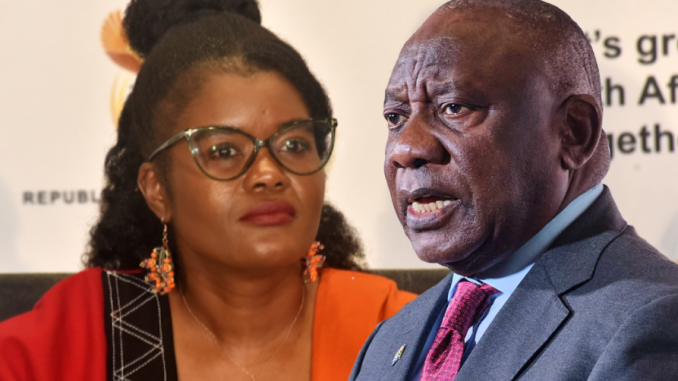
President Cyril Ramaphosa has officially dismissed Nobuhle Nkabane from her position as Minister of Higher Education, Science, and Innovation, following mounting allegations of misconduct linked to the appointment of leadership in the country’s Sector Education and Training Authorities (SETAs).
The dismissal, which took place on Monday, July 21, came after weeks of public and parliamentary scrutiny. Nkabane had faced serious accusations of misleading Parliament by claiming that an independent selection panel had recommended the appointment of SETA board chairpersons. However, upon investigation by Parliament’s Portfolio Committee, it was revealed that no such independent panel ever existed.
Individuals who were allegedly part of the panel publicly denied any involvement in selecting the board leaders, and documentation backing up the claim was never provided. This development raised questions not only about the integrity of the appointments but also about the broader governance of public institutions tasked with managing vocational and skills development across South Africa.
Nkabane’s dismissal was also politically significant. The Democratic Alliance, the ANC’s coalition partner in the newly formed Government of National Unity, had threatened to vote against the 2025/2026 Appropriation Bill if Nkabane remained in office. The DA viewed her conduct as a direct violation of transparency and accountability, citing her actions as incompatible with the standards required of public office.
President Ramaphosa’s decision to remove her came just in time to secure DA support for the national budget vote, temporarily stabilizing tensions within the coalition government. The DA described her removal as a “minimum first step” toward restoring credibility in the cabinet, while other political parties, including Rise Mzansi, ActionSA, and the Economic Freedom Fighters, also welcomed the move. Many saw it as a long-overdue response to what they considered political arrogance and disregard for institutional integrity.
Despite being removed, Nobuhle Nkabane has not admitted wrongdoing. In a televised interview with eNCA, she said that she was not surprised by her dismissal, having sensed it was coming for some time. She confirmed receiving a call from the President informing her of his decision as she was en route to Cape Town.
Nkabane insists that she has prepared evidence, including appointment letters and internal documentation, that will clear her name and show that her actions were lawful and justified. She has stated her intention to return to Parliament and defend her conduct when summoned by the Portfolio Committee. She remains a Member of Parliament and appears resolute in challenging the narrative that led to her removal.
In the wake of her dismissal, President Ramaphosa swiftly appointed Buti Manamela, the former Deputy Minister, as the new Minister of Higher Education. Nomusa Dube-Ncube, previously Premier of KwaZulu-Natal, has taken up the role of Deputy Minister. The reshuffle is expected to bring renewed focus on governance and reform within the department. Meanwhile, Parliament continues to investigate the full scope of the SETA board appointment controversy.
The Portfolio Committee has confirmed it will release a report on the matter and may invite Nkabane to testify under oath to clarify the contradictions between her statements and the evidence presented. The outcome of this investigation could have broader implications for other cabinet members and coalition dynamics.
This episode has highlighted the growing influence of coalition politics in South Africa, as well as the importance of parliamentary oversight in holding ministers accountable. With budget deadlines looming and public confidence in government leadership under strain, the handling of the Nkabane matter may serve as a litmus test for how seriously the Ramaphosa administration takes ethical governance. Whether the dismissal represents a genuine shift toward accountability or simply a necessary compromise to preserve coalition unity remains to be seen.

Leave a Reply